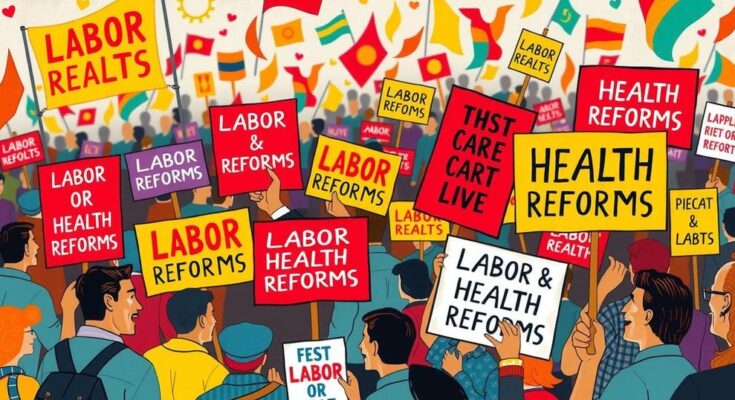President Gustavo Petro urged Colombians at a rally to support labor and health reforms and proposed a special election to allow citizens to vote on these initiatives. The reforms have faced legislative hurdles, and Petro claims that strong political opposition is impeding progress. The upcoming special election will require significant voter turnout to enact changes and reflects the President’s ongoing challenge to consolidate support amid criticisms of his proposed policies.
Colombian President Gustavo Petro recently addressed supporters at a rally in Bogotá, emphasizing the need for labor and health reform initiatives that have faced difficulties in securing legislative approval. He urged citizens to rebel against centrist and right-wing politicians impeding these changes as the nation approaches upcoming congressional and presidential elections.
During this rally, President Petro expressed plans to facilitate a special election that would allow the public to vote on health and labor legislation, which has remained stagnant in Congress due to political discord. He remarked on the sacrifices made by the populace, stating, “The people have made lots of sacrifices to be governed now by monarchs and tyrants” while alluding to those opposing his reforms as engaging in exploitation driven by greed.
The president noted that his Historical Pact movement holds only a fifth of the Senate seats, complicating efforts to pass significant reforms. He granted government employees a day off to encourage participation in the demonstrations advocating for the special election, which garnered substantial attendance.
In his address, President Petro accused Congress members of prioritizing corporate interests over the well-being of the populace. The proposed special election, or popular consultation, requires Senate approval and mandates that one-third of registered voters participate for the outcomes to be enacted.
Political analysts express skepticism regarding the potential voter turnout necessary to successfully implement these reforms. While the special election presents an opportunity to galvanize public support, it may also serve to distract from the challenges faced by the government in reaching consensus in the legislature.
President Petro’s health reform aims to shift management of social security payments from insurance companies to a government agency, driven by accusations of financial mismanagement within these firms. His labor reform, which seeks to enhance pay for night workers and limit short-term hiring, is also facing scrutiny and has encountered resistance in legislative discussions.
Critics of the proposed reforms argue they could have adverse effects on employment, particularly threatening jobs for those working in Colombia’s large informal economy, which comprises over 55% of the workforce without formal contracts. Advocates for the reforms contend that transforming labor laws could create better job conditions for these workers.
President Gustavo Petro’s call for a special election on labor and health reforms reflects his commitment to transforming Colombia’s governance amidst political challenges. While Petro faces formidable opposition in Congress and skepticism surrounding voter turnout for the proposed election, he continues to rally support for his initiatives. The outcome of these efforts could significantly influence Colombia’s labor landscape and health systems, which are critical to the welfare of millions.
Original Source: apnews.com




